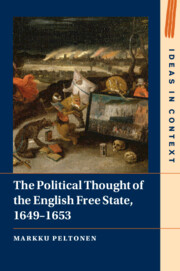Book contents
- The Political Thought of the English Free State, 1649–1653
- Ideas in Context
- The Political Thought of the English Free State, 1649–1653
- Copyright page
- Dedication
- Contents
- Acknowledgements
- Introduction
- Chapter 1 Changing the Form of Government
- Chapter 2 Anti-monarchism
- Chapter 3 The Free State
- Chapter 4 Aristocracy
- Chapter 5 Democracy
- Epilogue
- Bibliography
- Index
Epilogue
Published online by Cambridge University Press: 13 October 2022
- The Political Thought of the English Free State, 1649–1653
- Ideas in Context
- The Political Thought of the English Free State, 1649–1653
- Copyright page
- Dedication
- Contents
- Acknowledgements
- Introduction
- Chapter 1 Changing the Form of Government
- Chapter 2 Anti-monarchism
- Chapter 3 The Free State
- Chapter 4 Aristocracy
- Chapter 5 Democracy
- Epilogue
- Bibliography
- Index
Summary
The English free state ended in failure in the spring of 1653 when Oliver Cromwell dissolved the Rump parliament, which was soon replaced by the unelected Nominated Assembly. In December 1653, this Assembly abdicated its authority to Cromwell, who became the Lord Protector under the Instrument of Government, England’s first written constitution. This failure has led historians to write the free state off as a terrible mistake, which almost no one outside the small coterie of its leaders genuinely wanted or actively supported. Throughout this book, I have questioned this standard interpretation and tried to show that numerous people eagerly came forth in the defence of the free state and that its political thought was far more important than has hitherto been assumed.
- Type
- Chapter
- Information
- The Political Thought of the English Free State, 1649–1653 , pp. 222 - 228Publisher: Cambridge University PressPrint publication year: 2022

